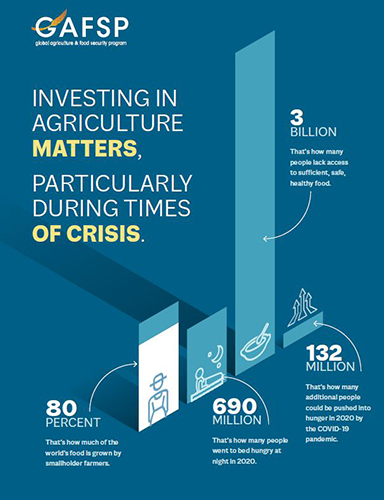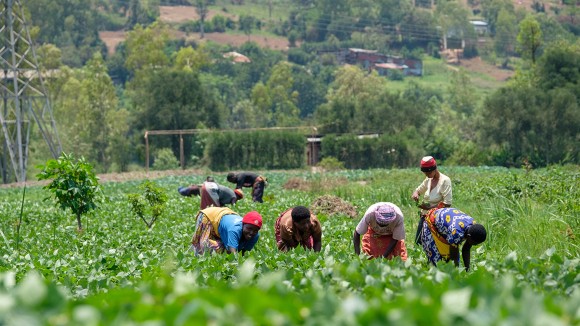The 'State of Food Security and Nutrition in the World' (SOFI) Report 2020 shows that the number of starving people has risen again. This effect is intensified by the consequences of the coronavirus. The World Food Programme (WFP) expects the number of people in need of direct food aid to rise from 135 million to 265 million in 2020. These are dramatic figures that must be put in relation to the G7 decision (Elmau 2015) to lift 500 million people out of hunger and poverty by 2030. In order to achieve this goal, the right measures must now be taken, political responsibility assumed and resources mobilized.
The German government therefore organised two separate but consecutive events on October 13th to create a joint appeal for the achievement of SDG 2 by 2030: The event 'A World Without Hunger is Possible - What to Do' in the morning, as well as the virtual event at the start of the GAFSP replenishment phase 2020-2025 'Partnering to Transform Food Systems Globally'.
The German government invited a Nobel Prize winner, representatives of UN organizations, scientists and decision-makers to discuss the results of the Ceres2030 study and the ZEF/FAO report. Objective of the two studies was to determine how much public money should be invested in which measures to end hunger and malnutrition by 2030. The aim of the event is to provide new impulses for the achievement of SDG2 in the run-up to World Food Day on October 16, 2020, and to translate these into recommendations for action and solutions from the international community to the European Commission.
- Katie Gallus Host
- Dr Gerd Müller Federal Minister for Economic Cooperation and Development
- Carin Smaller IISD and Co-Director Ceres2030 - Presentation of the findings from the Ceres2030 study on the main causes of hunger
- Dr Magdalena Skipper
Editor in Chief, Nature - Presentation of the Nature special issuefeaturing the Ceres2030 study
Ending hunger: science must stop neglecting smallholder farmers
Policymakers urgently need ideas on ways to end hunger. But a global review of the literature finds that most researchers have had the wrong priorities. - Professor Joachim von Braun Director of the Center for Development Research (ZEF) and Chair of the scientific advisory group to the 2021 UN Food Systems Summit- Challenges, solutions, investments – presentation of the findings from the recent ZEF/FAO study
- Professor Abhijit Vinayak Banerjee 2019 Nobel Memorial Prize laureate in Economic Sciences - Hunger follows poverty – the links between SDG 1 and SDG 2
- Bill Gates Co-Chair of the Bill & Melinda Gates Foundation - Video message: Investing in Innovation – Strengthening Rural Livelihoods in the Face of Climate Change
- Dr Agnes Kalibata UN Special Envoy for the 2021 Food Systems Summit
- Dr Ousmane Badiane Co-Chair – Executive Chairperson of Akademiya2063
- Dr Máximo Torero Chief Economist of the FAO Jutta Urpilainen EU Commissioner for International Partnerships
Müller and EU Commissioner Jutta Urpilainen
- Jutta Urpilainen EU Commissioner for International Partnerships - Europe’s responsibility for ‘a world without hunger’
- Dr Maria Flachsbarth Parliamentary State Secretary to the Federal Minister for Economic Cooperation and Development
A Policy Brief
October 12th, 2020
Ending Hunger by 2030 – policy actions and costs
Joachim von Braun (ZEF), Bezawit Beyene Chichaibelu (ZEF), Maximo Torero Cullen (FAO),
David Laborde (IFPRI), Carin Smaller (IISD) (8 pages)
Uniting science and policy to end hunger sustainably - A launch event for Ceres2030.
Almost 80 researchers spanning 23 countries worked intensely for three years to identify the most promising solutions to building sustainable food systems and to tell donors how much it would cost to end hunger by 2030.
Cooperation on research and innovation has steered the international agenda towards a different approach to agricultural research. The latest report on sustainable solutions to end hunger (CERES 2020) finds that most researchers “had the wrong priorities”. Only around 10% compared the many existing agricultural practices to evaluate what works and what doesn’t: “science must stop neglecting smallholder farmers”.This launch event (the video recording and PPT will be available here) focused on how much public spending is needed in low- and middle-income countries, including donor contributions through official development assistance (ODA), to achieve the UN Sustainable Development Goal 2, zero hunger. Panellists explored a diverse mix of agricultural interventions in three broad areas—farm-level interventions to directly improve farm productivity, drivers in market systems that can facilitate storage and services that farmers need, and social interventions to empower rural populations.
Donors must double aid to end hunger - and spend it wisely. Ceres2030’s new research shows that by doubling their investments between now and 2030, donors could help end hunger, double smallholder farmer incomes and protect the climate.
Speakers
Panelists explored a diverse mix of agricultural interventions in three broad areas—farm-level interventions to directly improve farm productivity, drivers in market systems that can facilitate storage and services that farmers need, and social interventions to empower rural populations.
- David Laborde - Senior Research Fellow, IFPRI & Ceres2030 Co-Director @IFPRI
- Jaron Porciello - Associate Director, Cornell University & Co-Director Ceres2030 @Cornell University
- Dr. Eugenie Maiga - Lead author, Associate Professor, Norbert Zongo University @Norbert Zongo University
Background:
- Ceres2030 is a joint project between Cornell University, the International Institute Food Policy Research Institute (IFPRI), and the International Institute for Sustainable Development (IISD).
- This launch event will focus on how much public spending is needed in low- and middle-income countries, including donor contributions through official development assistance (ODA), to achieve the UN Sustainable Development Goal 2, zero hunger.
- For more information on this event please see this programme.
- A Policy Brief October 12th, 2020 Ending Hunger by 2030 – policy actions and costs Joachim von Braun (ZEF), Bezawit Beyene Chichaibelu (ZEF), Maximo Torero Cullen (FAO), David Laborde (IFPRI), Carin Smaller (IISD) (8 pages)
- Laborde, D., Parent, M., & Smaller, C. (2020). Ending Hunger, Increasing Incomes, and Protecting the Climate: What would it cost donors? Ceres2030. International Institute for Sustainable Development (IISD) and International Food Policy Research Institute (IFPRI). (28 pages)
- From Potentials to Reality: Transforming Africa´s Food Production. Investment and policy priorities for sufficient, nutritious and sustainable food supplies. October 2020. A Study by ZEF. (165 pages)
- Ceres2030 Summary: Sustainable Solutions to End Hunger. A world without hunger is possible - it is within reach. So let's act: Summary report of the CERES2030 study by IFPRI, Cornell University and IISD. (40 pages)
- Investment costs and policy action opportunities for reaching a world without hunger. A Study by ZEF in cooperation with FAO (96 pages)
- Nature special issue featuring the Ceres2030 study
- Ending Hunger Sustainably: The role of social protection (8 pages) - In this brief, the Ceres2030 project team discusses the crucial role social protection plays in addressing poverty and vulnerability, as well as in mitigating the impact of COVID-19 and its associated economic consequences. (Read in English | Lire en français)
- Ending Hunger Sustainably: The role of gender (8 pages) - This briefing note points to the challenges, highlights some interventions that have proven to be effective, and hopes it can contribute to making the case that gender must be counted and consciously included if women’s empowerment is to get the place it deserves in realizing the 2030 Agenda. (Read in English | Lire en français)
- A Global Value Chain of Knowledge to End Hunger Sustainably (8 pages) - The SDG agenda is complex and integrated. It is an aspirational view of future societies that are able to secure a decent life for everyone on a thriving planet. Crises such as the COVID-19 pandemic test this vision. This is an introduction to the research tools that can be used by governments and donors to decide how much and where to spend scarce resources to solve the multiple and complex global challenges to sustainable development. (Read in English | Lire en français)
Partnering to Transform Food Systems Globally. Launch of the GAFSP 2020-2025 Replenishment  Period.
Period.
GAFSP’s donors partner with recipient countries, civil society organizations, and other stakeholders to improve the lives of smallholder farmers and their families. Over the last 10 years, the Program’s donors have committed US$1.7 billion. But, GAFSP requires an additional US$1.5 billion for the period 2020–2025 to ensure that GAFSP is fully funded. This will enable GAFSP to launch predictable Calls for Proposals throughout this period and continue supporting smallholder farmers, businesses, and countries to achieve food and nutrition security for all.
- Event Host/Moderator: Femi Oke, International Journalist & Presenter
- Opening Remarks by Dr. Gerd Müller, Federal Minister for Economic Cooperation and Development, Germany
- Video: Farmers at the Forefront
- Dr. Maximo Torero, Chief Economist, Food and Agriculture Organization of the United Nations (FAO)
- Jaron Porciello, Co-director, Ceres2030
- Dave Prescott, Creative Director, The Partnering Initiative
- Dr. Agnes Kalibata, UN Special Envoy for the 2021 Food Systems Summit
- Dr. Claudia Sadoff, Managing Director, Research Delivery and Impact, CGIAR System Organization
- Ibrahima Coulibaly, President, Network of Farmers' and Agricultural Producers' Organisations of West Africa (ROPPA)
- Gilbert Houngbo, President, International Fund for Agricultural Development (IFAD)
Launch of GAFSP’s Replenishment Period
As part of GAFSP’s first replenishment period to raise US$1.5 billion over five years, Australia, the Bill and Melinda Gates Foundation, Germany, Norway, and Spain announced over US$300 million in new contributions to GAFSP – meeting its yearly replenishment target for 2020. This new funding will allow GAFSP to continue its support for smallholder farmers, businesses, and countries to achieve food security by launching a new Call for Proposals in early 2021 to support COVID-19 response and recovery.
22 October 2020 – 13:00-15:30 GMT Uniting Science and Policy to End Hunger. A conversation on Sustainable Development Goal 2 presented by Nature Research
- Remarks by Martien van Nieuwkoop, Global Director, Agriculture and Food Global Practice, World Bank
- Video: GAFSP: A Partnership for Food Security
- Remarks by Dr. Natasha Hayward, Program Head, GAFSP
Conversation between the Moderator and:
- Honorable Jeanine Cooper, Minister of Agriculture, Liberia
- Noël Koutera Bataka, former Minister of Agriculture, Togo
Endorsements & Announcements by GAFSP donors
- Honorable Alex Hawke, Minister for International Development and the Pacific, Australia
- Bill Gates, Co-chair, Bill & Melinda Gates Foundation
- Kitty van der Heijden, Director-General for International Cooperation, Ministry of Foreign Affairs, the Netherlands
- Aksel Jakobsen, State Secretary of International Development , Ministry of Foreign Affairs, Norway
- Honorable James Duddridge, Minister for Africa at the Foreign, Commonwealth & Development Office (FCDO), United Kingdom
- Honorable Arancha González Laya, Minister of the Ministry for Foreign Affairs, European Union and Cooperation, Spain
Related events:
22 October 2020 – 13:00-15:30 GMT Uniting Science and Policy to End Hunger. A conversation on Sustainable Development Goal 2 presented by Nature Research




No comments:
Post a Comment